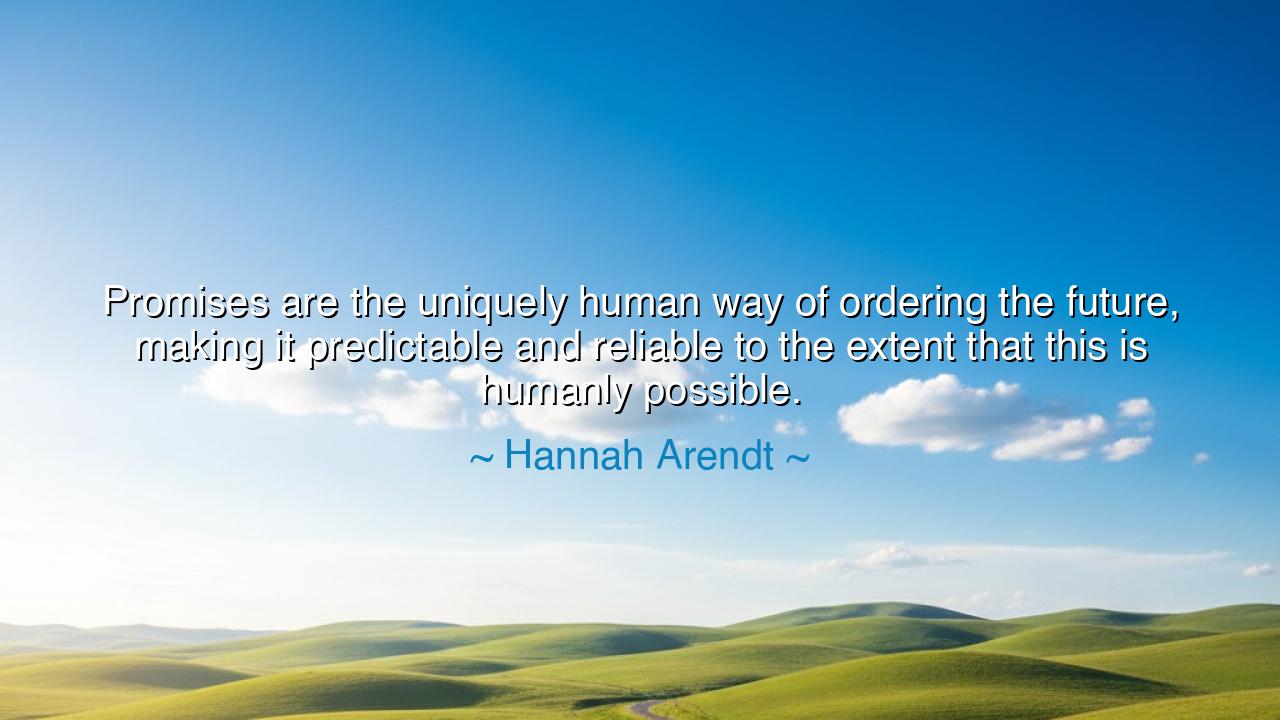
Promises are the uniquely human way of ordering the future
Promises are the uniquely human way of ordering the future, making it predictable and reliable to the extent that this is humanly possible.






"Promises are the uniquely human way of ordering the future, making it predictable and reliable to the extent that this is humanly possible." – Hannah Arendt.
In this thought-provoking quote, Hannah Arendt reflects on the profound nature of promises as a cornerstone of human interaction and societal structure. She suggests that promises—the act of committing to future actions—are what allow us to shape the future with a sense of predictability and trust. Unlike animals, whose actions are largely driven by instinct and the immediate present, humans possess the unique ability to look forward, make commitments, and create a sense of order in a world otherwise governed by uncertainty. A promise is more than a simple agreement; it is an act that binds the future to the present, making the abstract concept of time manageable and trustworthy to the best of human capability.
The ancient world understood the significance of promises in a deeply profound way. In Greek philosophy, Socrates emphasized the importance of integrity and honor in one’s words and actions. To him, the human soul was bound to its actions, and the ability to speak truthfully and keep promises was a reflection of a well-ordered soul. Aristotle also recognized that human beings, unlike animals, are capable of rational thought and are defined not just by what they do in the present but by their ability to make decisions about the future. Promises, in this sense, are not mere words but expressions of the moral fabric that holds society together. In Arendt’s view, they represent a human capacity to project and shape the future, creating bonds of trust and stability in a world that might otherwise seem chaotic.
Consider the example of Alexander the Great, who, though a military leader, understood the power of promises in shaping his future and the loyalty of his followers. Alexander’s conquests were not solely driven by force; his ability to make promises to his soldiers and to the peoples he encountered helped cement his legacy. His promise of freedom to certain nations, his commitment to spread Greek culture, and his words to his soldiers all created a sense of shared purpose and trust. In doing so, he transformed an uncertain, dangerous world into a space where the future could be anticipated and shaped through the bonds of his promises. Alexander’s life illustrates that promises are not just about individual actions but about creating a collective vision that moves people forward with a sense of shared responsibility.
In more recent history, the civil rights movement in the United States also provides a powerful example of how promises to the future can shape society. Martin Luther King Jr., through his speeches and actions, made a promise to future generations that freedom, justice, and equality could be achieved. His famous "I Have a Dream" speech was not merely a vision but a promise to a generation of African Americans that the struggles of the present would lead to a future where the chains of oppression would be broken. The movement was built on the commitment of countless individuals who promised to fight for a future where justice and equality would not just be ideals, but realities. This promise, sustained by their actions, created the momentum that changed the course of American history.
The idea of promises as a force that shapes the future is not just a personal or political concept—it is also central to our daily lives. The way we make commitments to others—whether in relationships, work, or society—determines the trust and stability that others place in us. In ancient times, trust was the foundation of society. Without it, there could be no commerce, no friendship, no government. In modern times, business agreements, marriages, and even friendships are built on the foundation of promises. To make a promise is to create a link between the present and the future, and to ensure that the future is something we can depend on, even in the face of uncertainty.
The lesson from Arendt’s insight is that we must value our promises and honor our commitments. By doing so, we help create a world where the future is not a distant, uncertain realm but a continuation of the trust we build today. Promises shape our relationships with others, build the fabric of society, and ultimately give us the power to create a future that reflects the ideals we hold dear. In this sense, every promise we make is not just a personal decision but a contribution to the larger movement of humanity, a way to order the future with integrity and foresight.
In our own lives, let us reflect on the promises we make, recognizing that they are more than just words—they are foundations for a future we are actively shaping. Whether in small, everyday interactions or in the larger commitments we make, we can be conscious of the power our promises hold. Let us honor them, knowing that they are not just binding agreements, but the very threads that weave the tapestry of our shared future. Just as the great figures of history used promises to inspire and build a better world, so too can we. In every promise, we hold the power to create a future where trust, integrity, and hope flourish.






AAdministratorAdministrator
Welcome, honored guests. Please leave a comment, we will respond soon